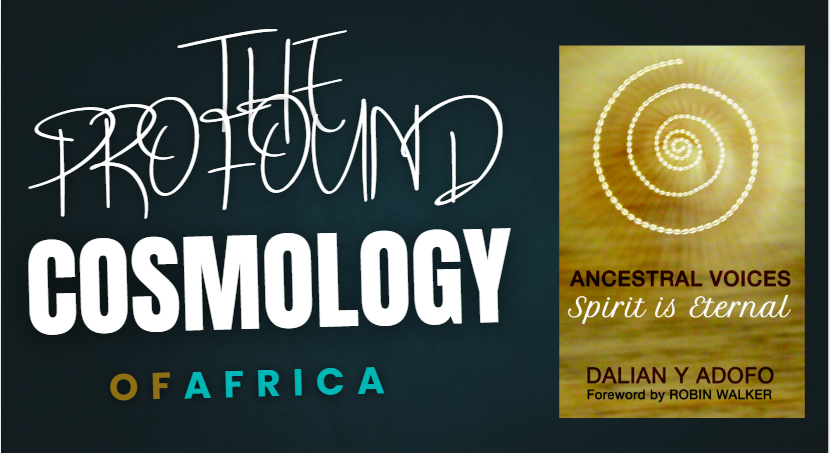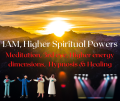
Ancestral Voices: Spirit is Eternal is a book exploring indigenous African spirituality and its global diaspora. The text provides a detailed overview of core concepts, including the nature of existence, the interconnectedness of all things, and the importance of ancestors. It examines various conceptions of the Creator, often depicted as both male and female, and emphasizes the role of nature and ritual in maintaining balance and harmony. The book challenges misconceptions about African spirituality, arguing for its richness and sophistication, while also highlighting its practical applications for contemporary life. A foreword by Robin Walker emphasizes the book’s timeliness and importance in a world increasingly questioning traditional religious narratives.
. What are the core components of the African spiritual worldview?
The African spiritual worldview is characterized by the interconnectedness of all things and the existence of two realms: the physical and the spiritual. These realms are constantly interacting, and what happens in one can affect the other. Within this framework, there is a cyclical view of existence where everything transforms rather than disappears, and a strong emphasis on balance between opposing forces. It also incorporates a social and spiritual hierarchy where earthly organization mirrors that of the spiritual realm, with intermediaries playing a vital role in communication with the divine. Dreams and divination are considered important methods for accessing information from the spiritual realm, and all things are considered to have a spiritual essence from the Creator within them.
2. How is the Creator/God conceptualized in African spiritual systems?
The Creator is not limited to a single anthropomorphic form but is often understood through various names, each reflecting an aspect of its function, power, or greatness. The Creator is also conceived of as Nature itself, encompassing all elements, celestial bodies, and the natural world. Importantly, the Creator is viewed as having both masculine and feminine principles, often depicted as a pair, and is also understood to be a formless, self-conscious, intelligent entity—a spirit, energy, and consciousness that is omnipresent, omnipotent, and omniscient. Furthermore, the first ancestor is also considered the Creator or a manifestation thereof.
3. What is the significance of nature in African spiritual practices?
Nature is of paramount importance, regarded as the very essence of the divine. It is not merely the physical landscape but also animals, elements, and celestial bodies. Nature is seen as a manifestation of the Creator’s omnipresence, omnipotence, and omniscience. Many natural formations such as mountains, rivers, trees, and the earth itself are considered sacred and worthy of veneration. Nature also provides for all existential needs, from food and shelter to healing, reflecting a symbiotic and divine relationship between humanity and the natural world.
4. How is the feminine principle represented in the understanding of the Creator?
In many African spiritual traditions, the feminine principle is given equal or even primary importance in the understanding of the Creator. Early depictions of the Creator are often female, with imagery linked to childbirth. The birthing process is used as a metaphor for the act of creation, and the earth is commonly seen as a female deity, the Mother Earth. This emphasizes the generative and nurturing aspect of the divine and demonstrates the functional nature of spiritual concepts rather than simple anthropomorphism.
5. What is the role of ancestors in African spiritual practices?
Ancestor veneration is a central practice. Ancestors are seen as an essential link between the living and the spiritual realm, not simply as departed family members, but as a connection to the very first ancestor, or the Creator. Through prayers, rituals and reverence, the living seek guidance, protection and assistance from the ancestors. Furthermore, those ancestors who lived exemplary lives are sometimes elevated to the status of a deified ancestor, showing that human beings are conceived of as aspects of the Creator, having individual experiences and thus upon passing on, return to that source.
6. What are the various forms of veneration used in African spiritual traditions?
African spiritual traditions employ a wide range of veneration forms including prayers, shrines, altars, sacrifices, libations, offerings, singing, dancing, drumming, and meditation. These forms aim to maintain balance and harmony within oneself, with the community, and with the cosmos. They serve as a means of communication with the spiritual realm, to honor nature, ancestors and the Creator.
7. What is meant by the concept of “interconnectedness” in African cosmology?
The concept of interconnectedness highlights that all things in the universe are linked and impact each other. It signifies that every action, thought, and experience has a cause and effect relationship within the dynamic interplay of existence. It is also expressed in communal philosophies such as Ubuntu, which emphasizes that the individual’s well-being is tied to that of the collective. This also highlights how what is willed in the mind can manifest in physical reality and also why ritual practices are an important method for achieving desired ends.
8. How do African spiritual concepts relate to the contemporary understanding of the universe?
African spiritual concepts show correlations with contemporary scientific theories. For instance, the African understanding of interconnectedness aligns with the scientific Chaos Theory, specifically, “the Butterfly Effect.” Also, the notion that thought energy can manifest into physical reality is supported by the principle of visualization as well as Quantum Physics theories. This suggests a need to re-examine African spiritual concepts as a valuable source of knowledge that can inform contemporary life.
Quiz
Instructions: Answer the following questions in 2-3 sentences each, based on the source material.
- According to the text, how does the African worldview understand the nature of existence?
- What role does the concept of balance play in African spirituality?
- Explain the idea of “interconnectedness” in the African worldview.
- How is the social and spiritual hierarchy reflected in African societies?
- What does the concept of cyclical existence imply about reincarnation?
- How does the text describe the “spirit of being” in the African context?
- What are some examples given in the text of how Africans conceptualize the Creator?
- Why is nature so important in African spiritual systems?
- How is the concept of the Creator as female understood in African spirituality?
- What does the text suggest about the role of ancestors in African spiritual traditions?
Quiz Answer Key
- The African worldview understands existence as comprising two realms, the physical and the spiritual, which constantly interact. The spiritual realm is stratified and includes spaces for ancestors and deities. This constant interaction maintains order and balance.
- Balance is seen as a necessity for harmony between the physical and spiritual realms. Opposing forces, such as ‘good’ and ‘bad’, are viewed as complementary and essential for learning and growth. Ritual is often used to restore or maintain balance.
- The African worldview stresses that all things are interconnected and affect each other, where cause and effect are ever-present. This interconnectedness means that actions, thoughts, and experiences have reciprocal consequences across all aspects of existence.
- Social organization in African societies is believed to reflect the hierarchical structure of the spiritual realm. The king is viewed as a representation of the Creator, while other officials act as intermediaries with specific responsibilities and powers.
- Cyclical existence suggests that nothing is ever truly lost, but rather transformed into another form. This understanding supports reincarnation, with the belief that individuals are given multiple opportunities to fulfill their divine purpose.
- The “spirit of being” refers to the essence of the Creator present in all things, animate and inanimate. It is a vital force or consciousness that connects all beings to the Divine and motivates the goal of reunification.
- Africans conceptualize the Creator through multiple titles, each describing a particular function or aspect of the Divine, such as ‘the provider,’ ‘the all-powerful rock,’ or ‘the beginner and the unending Almighty.’ This indicates that Africans did not try to personalize God into a human form, but rather focused on function.
- Nature is seen as a manifestation of the Divine and is thus considered sacred in African spiritual systems. Its omnipresence, omnipotence, and omniscience are all recognized and seen as vital for sustaining life and guiding humanity.
- The earliest depictions of the Creator in Africa are of a female, often pregnant, thus emphasizing the role of birthing and coming into form as critical to understanding the act of creation. The feminine aspect is understood as foundational to the generative process of life.
- Ancestors are highly venerated as they are seen as having returned to the Creator. Veneration of ancestors goes beyond simply honoring relatives, but is an act of reverence to the Supreme Creator as they are viewed as having attained divine status.
Essay Questions
Instructions: Consider these essay questions in relation to the text. No answers are provided below.
- Discuss the ways in which the text challenges traditional Western understandings of religion, particularly concerning the concept of the Creator and the role of nature.
- Analyze how the principles of interconnectedness and cyclical existence shape African spiritual practices and their views on human purpose.
- Explore the significance of ancestor veneration in African traditions, using examples from the text to illustrate its various dimensions and meanings.
- Compare and contrast the African conceptualizations of the Creator as presented in the text, considering the various forms, titles, and attributes assigned.
- Evaluate how the concepts of balance and harmony are fundamental to the African worldview, as depicted in the text, and how they influence ritual and daily life.
Glossary of Key Terms
Ancestor: A deceased relative or member of a community, who is often revered and believed to have the ability to influence the living. They can, at times, reach a deified status if they lived an exemplary life.
Ase: The manifestation principle or life force concept within the Yoruba traditions. It is contained within the life-blood of humans, animals, plants, and rocks alike.
Chi: The animating life force or spirit in Igbo traditions, seen as a part of the Creator and present in all things.
Cyclical Existence: The belief that life is not linear but rather a recurring cycle of birth, death, and rebirth, with the spirit continuously being transformed.
Divination: Practices or methods to seek knowledge and guidance from the spiritual realm.
Interconnectedness: The concept that all things in the universe are linked and influence one another through cause and effect.
Libation: A ritual pouring of liquids, often water or alcoholic beverages, as an offering to ancestors or deities.
Mana: A vital/life force present in all things in Bantu traditions of Central, East, and Southern Africa. Higher cultivation of mana is believed to confer blessings.
Nyama: The life force concept among the Dogon people of West Africa, believed to be transmitted from generation to generation and contained in the bloodstream.
Omnipotent: All-powerful, a reference to the power of nature and the Creator.
Omnipresent: Ever-present, everywhere at all times, in reference to the Creator as spirit energy, consciousness, and the nature of the universe.
Omniscient: All-knowing, an attribute assigned to nature and the Creator.
Reincarnation: The belief that after death, the spirit returns to be reborn in another form or body.
Ritual: Prescribed patterns of action and ceremony intended to maintain balance, venerate the divine, and promote positive outcomes.
Shrine: A sacred place or structure dedicated to a deity or ancestor, often used for worship and offerings.
Spirit Being: An understanding of humans that they are primarily of a spiritual essence that has inhabited a physical body.
Ubuntu: A Bantu concept that emphasizes the interconnectedness and interdependence of individuals within a community.


















0 responses on "The Profound Cosmology of Africa: Exploring the Spiritual Universe"